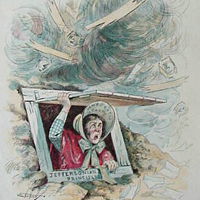Paradise is a metaphor for a perfect place with only goodness and love? Philosophy is like art. It imitates it in conceptualization, and attempts to address intellectually the elements of meaning in life like “paradise.” The yearning for paradise. An artist wants to express paradise, show or make it. A philosopher wants to understand the idea of paradise.
And some of us want to create it in our lives. And maybe by understanding be personally equipped to create it or support its creation, but if you would take any action at all, you have to have some form of ideation. No idea, no responsive action. This is why there are so many metaphysical practices and religion. That drive not only to see what is or could be, but the desire to do something about it. But can we do any such thing without metaphor?
A story of metaphor. A boy lost in a dark forest, not knowing meanings, what is in the dark, or where to go. Then some light helped him to see things he couldn’t see, but the light hurt his eyes and he didn’t feel happier. Excellent example. What I have been talking about is the realization that metaphor isn’t only imaginary, or on the other hand, the realization that the images of our senses are equally imaginary.
Many people don’t really want the truth. Well, the light can’t be blinding/restrictive. We often have to find the frayed edges to be able to make any new cloth.
I feel many poems are like that, philosophical poems. The images within embody a lot more beyond. Every artist will say this. That their art is inspired by experience. Is it not truth that we can experience a very great deal that doesn’t seem to be literally material?
Metaphor in literature is just imitating life? Imitating and depicting the “unseen.” We experience very much more than we see, like the story of Saint Patrick driving out all the snakes from Ireland. Now, if you were a greatly inspired holy man and you helped perhaps a whole culture feel faith instead of doubt, then would that not be driving all the snakes out of Ireland?
Maybe good literal materials are condensed, expandable, and stimulate us to relate to a lot more beyond the original work? I fully agree. This is what I do with world religious texts.
The snake was linked to suggestive impulse, an insinuating doubt. This was the only thing the snake did, make Eve doubt. I paraphrase the garden of Eden story, and only a short bit to allow the explanation of how Saint Patrick could have done something metaphorically that he could not have done literally. There were not and never have been snakes in Ireland, not literally. Drive out the snakes and you unify the people in their values, thus giving them a gift of peace that before in their history they never had.
Similar to dealing with your own demons, and ridding yourself of them? Yes. The people are grateful to Saint Patrick for what he did in unifying them, but that didn’t last forever. To clarify, Saint Patrick is significant to Ireland and by extension the Irish, like the immortals of Chinese legend perhaps. Each embodying some key aspect of the Chinese understanding of humanity, the land, and the cosmos. They may never have been literal people. Do they need to have been?
I once saw a painting of Eve in Eden. It seems the artist adores the image when Eve was curious and heading for the point of no return. Oh yes, and it has a lot of spiritual force from one point of view. Other people use different metaphors to describe the sense of spiritual loss in humanity. Know those and you can know how to restore balance, if you don’t become identified with shame.
Your thoughts are welcome. Be well friends.
Travis Saunders
Dragon Intuitive
~science,mysticism,spirituality~

